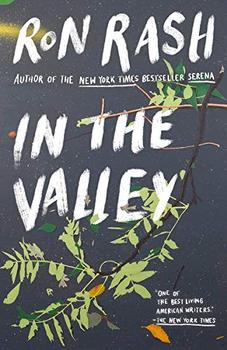Summary | Excerpt | Reviews | Beyond the Book | Readalikes | Genres & Themes | Author Bio

Stories and a Novella Based on Serena
by Ron Rash
Colonel Allen stepped out of the door and gave orders to mount.
The clatter of the men and horses leaving did not wake the children. Rebecca went outside, looked down the valley, and saw that smoke yet hovered above the two farms. A skein of smoke, nothing like the billowing plumes that rose a year ago at Brice and Anna's place, last June at Ira's. Everyone in Shelton Laurel would soon know the soldiers had come. They would hear or see them passing on the pike that led back to Marshall. Some of the men might have time to fire a few shots. Then they would come and see if Rebecca and the children were safe.
But they would not arrive for a little while, so Rebecca went inside the cabin. Not wanting to waste a match, she pulled a half-burned piece of kindling from the hearth and walked to the barn. Nine years, Rebecca thought, remembering how Ezra was already kicking in her belly when she and Aaron had arrived from Buncombe County. The cabin had been here, but not the barn. Ira had come first to help, then others bringing axes and oxen. In a week the barn had been built. She remembered Aaron's warning the night before he left for Asheville—Always say Unionist.
A thick matting of straw lay in an empty stall. Rebecca dropped the kindling and soon flames spilled into the adjoining stalls before laddering up gate posts and beams. Only when flame blossomed in the loft did Rebecca leave the barn. Frost still limned the ground, and that was a blessing. It would keep the fire from spreading.
When she'd returned to the cabin, Rebecca opened the crock and saw Colonel Allen had not put the button back. Not even his button, not even that, she thought, as she took out the letters and held them above the flames. Foolish not to have done it before, Rebecca knew, and told herself to open her hand and let them go.
But she couldn't, so Rebecca put them in the container and placed it back in the cubbyhole. She went outside and saw that the barn had crumpled except for the locust beams. The thick smoke that clouded the sky minutes before was now no more, signaling to neighbors that the Confederates were gone.
By the time Ira and Brice arrived, the fire would be no more than a smolder. The two men would kick the ashes, hoping to find a locust beam with only its surface charred. They'd douse the beam with water from the spring and drag it from the rubble. The Ledford and Hampton men would arrive next, and soon after whole families. The Lunsfords and Smiths, then the Moores and the Sheltons. The women would bring food enough to get Rebecca and the children through the winter. Men would bring axes and the surrounding woods would sound like gunshots as the honed metal struck in the November air. All day the women would cook and tend fires. Children would gather kindling, then scuff among ashes for the iron nails that had secured the shingles. Everyone would work until dusk, then return the next day to help more. Ira Wilkey might or might not say We will get through this together, but that was understood. They were neighbors.
Excerpted from In the Valley by Ron Rash. Copyright © 2020 by Ron Rash. All rights reserved. No part of this excerpt may be reproduced or reprinted without permission in writing from the publisher.




Men are more moral than they think...
Click Here to find out who said this, as well as discovering other famous literary quotes!
Your guide toexceptional books
BookBrowse seeks out and recommends the best in contemporary fiction and nonfiction—books that not only engage and entertain but also deepen our understanding of ourselves and the world around us.